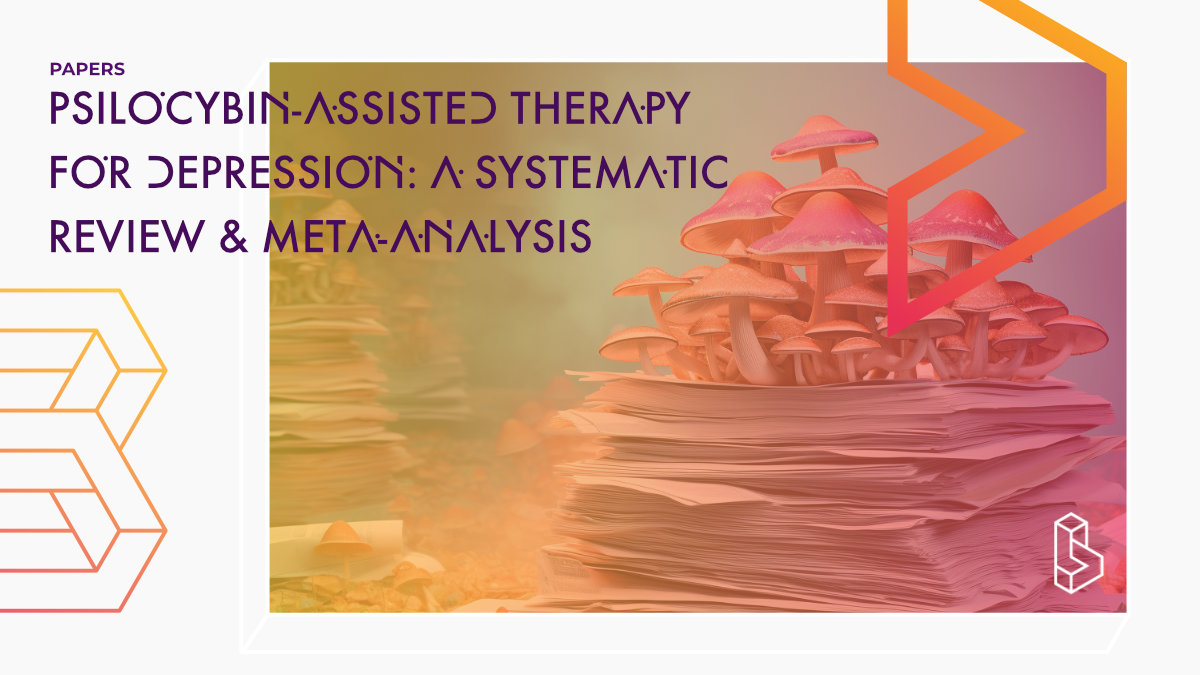This systematic review (s=13; n=686; 2023) analyzed the effects of psilocybin on depressive symptoms in patients diagnosed with life-threatening illnesses or major depressive disorder. The meta-analysis of 9 studies (n=596) found a significant and large effect in favour of psilocybin (SMD = -0.78; p<0.001) for reducing depressive symptoms. The review suggests preliminary evidence supporting the antidepressant efficacy of psilocybin-assisted psychotherapy but calls for further studies to assess safety, efficacy, and treatment optimization.
Abstract of Psilocybin-assisted therapy for depression: A systematic review and meta-analysis
“The aim of this review was to determine the effect of psilocybin on depressive symptoms in patients diagnosed with life-threatening illnesses or major depressive disorder. Systematic searches were conducted to search for randomized clinical trials and open-label trials that evaluated depression symptoms after psilocybin therapy. Data was pooled using a random-effects model. The primary outcome was the standardized mean difference (SMD) in depression severity, determined by calculating the change in depression ratings from baseline to the primary endpoint in the psilocybin arm versus the control arm. The literature search yielded 1734 studies, and 13 studies (n = 686) were included in either qualitative and/or quantitative analyses. The meta-analysis included 9 studies (pooled n = 596) and yielded a large effect size in favour of psilocybin (SMD = -0.78; p<0.001). Risk ratios for response and remission were large and significant in favour of psilocybin. A review of open-label trials showed robust decreases in depressive symptoms following psilocybin administration. These findings provide preliminary evidence for antidepressant efficacy with psilocybin-assisted psychotherapy, however, further studies are needed to evaluate safety and efficacy and to optimize treatment protocols.”
Authors: Sipan Haikazian, David C.J. Chen-Li, Danica E. Johnson, Farhan Fancy, Anastasia Levinta, M. Ishrat Husain, Rodrigo B. Mansur, Roger S. McIntyre & Joshua D. Rosenblat
Summary of Psilocybin-assisted therapy for depression: A systematic review and meta-analysis
Depressive symptoms associated with major depressive disorder and life-threatening cancer can be difficult to treat in many patients. Treatment-resistant depression necessitates a re-evaluation of current therapeutic paradigms.
Psychedelic-assisted psychotherapy is an emerging intervention that combines supportive psychotherapy with classic psychedelics such as psilocybin or lysergic acid diethylamide (LSD). Psilocybin is a naturally occurring psychedelic compound predominantly found in the Psilocybe genus of mushrooms.
Psilocybin has been used to treat psychiatric disorders since the 1950s, but was classified as a Schedule I substance in the 1970s. Recent studies have examined the use of psilocybin for treating mood disorders, obsessive-compulsive disorder, and alcohol and tobacco use disorders.
Find this paper
Psilocybin-assisted therapy for depression: A systematic review and meta-analysis
https://doi.org/10.1016/j.psychres.2023.115531
Paywall | Google Scholar | Backup | 🕊
Cite this paper (APA)
Haikazian, S., Chen-Li, D. C., Johnson, D. E., Fancy, F., Levinta, A., Husain, M. I., ... & Rosenblat, J. D. (2023). Psilocybin-Assisted Therapy for Depression: A Systematic Review and Meta-Analysis. Psychiatry Research, 115531.
Study details
Compounds studied
Psilocybin
Topics studied
Depression
Palliative Care
Treatment-Resistant Depression
Study characteristics
Meta-Analysis
Literature Review
Participants
686
Humans

